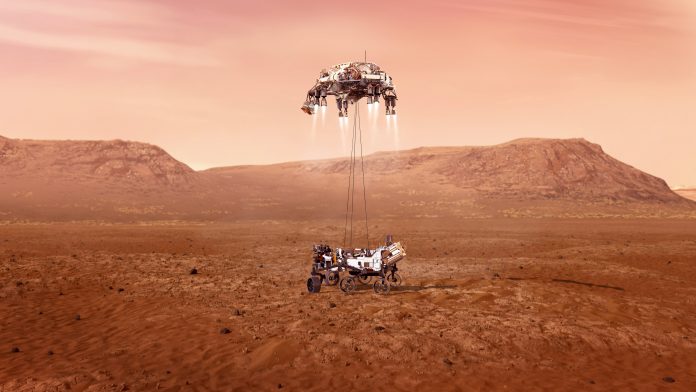NASA’s Perseverance rover made a successful and safe descent onto Mars yesterday (18th February) at 3:55 p.m. EST
Mission control at NASA’s Jet Propulsion Laboratory in Southern California announced the safe and successful touchdown of the Perseverance rover yesterday (18th February) at 3:55 p.m. EST (12:55 p.m. PST).
The rover was launched on July 30th 2020, from Cape Canaveral Space Force Station in Florida and travelled 293 million miles over a period of 203 days. It weighs 2,263-pounds and is around the size of a car.
Astrobiologist will undergo several weeks of testing before it begins its two-year science investigation of Mars’ Jezero Crater.
The mission will aim to discover if there was ever ancient life on Mars by collecting compelling rock and soil samples. The samples will then be collected on future missions to be sent back to Earth for analysis.
Human expeditions
It will also help to pave the way for future human expeditions to Mars by testing a method for producing oxygen, identifying other resources such as subsurface water, improving landing techniques, and characterising weather, dust, and other environmental conditions that could affect future astronauts living and working on Mars.
NASA’s acting Administrator Steve Jurczyk, said:
“This landing is one of those pivotal moments for NASA, the United States, and space exploration globally – when we know we are on the cusp of discovery and sharpening our pencils, so to speak, to rewrite the textbook. The Mars 2020 Perseverance mission embodies our nation’s spirit of persevering even in the most challenging of situations, inspiring, and advancing science and exploration. The mission itself personifies the human ideal of persevering toward the future and will help us prepare for human exploration of the Red Planet.”
Thomas Zurbuchen, associate administrator for science at NASA, said:
“Because of today’s exciting events, the first pristine samples from carefully documented locations on another planet are another step closer to being returned to Earth. Perseverance is the first step in bringing back rock and regolith from Mars. We don’t know what these pristine samples from Mars will tell us. But what they could tell us is monumental – including that life might have once existed beyond Earth.”
Lori Glaze, director of NASA’s Planetary Science Division, said:
“Perseverance is the most sophisticated robotic geologist ever made, but verifying that microscopic life once existed carries an enormous burden of proof. While we’ll learn a lot with the great instruments we have aboard the rover, it may very well require the far more capable laboratories and instruments back here on Earth to tell us whether our samples carry evidence that Mars once harboured life.”
Read more about the mission in detail here.











